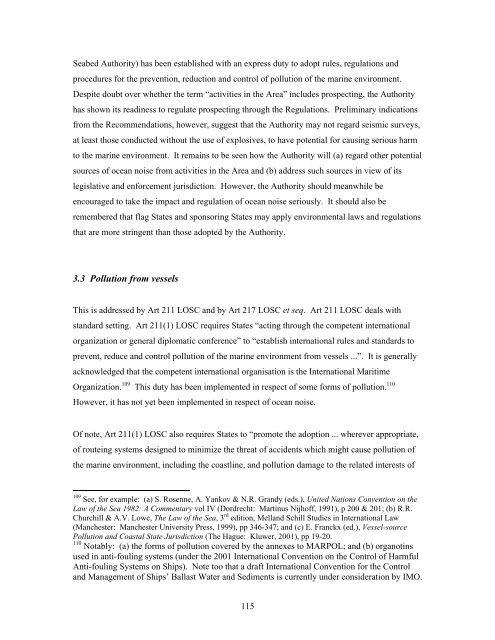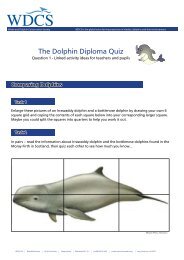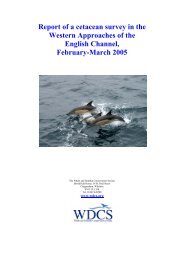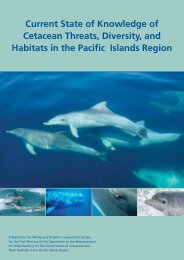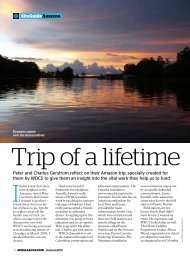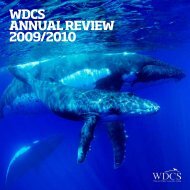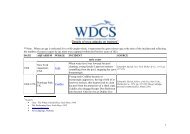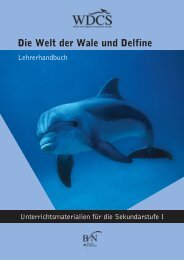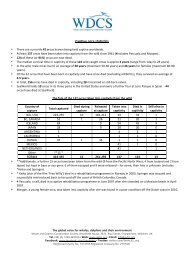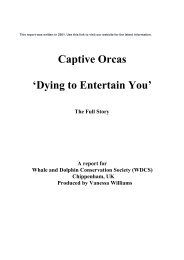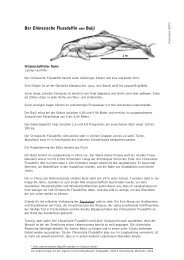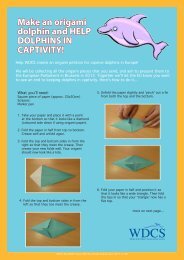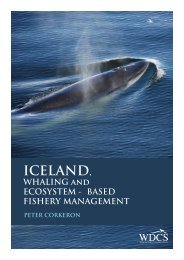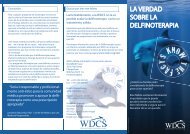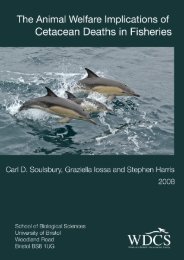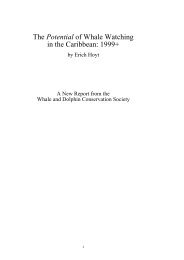Oceans of noise - Whale and Dolphin Conservation Society
Oceans of noise - Whale and Dolphin Conservation Society
Oceans of noise - Whale and Dolphin Conservation Society
Create successful ePaper yourself
Turn your PDF publications into a flip-book with our unique Google optimized e-Paper software.
Seabed Authority) has been established with an express duty to adopt rules, regulations <strong>and</strong><br />
procedures for the prevention, reduction <strong>and</strong> control <strong>of</strong> pollution <strong>of</strong> the marine environment.<br />
Despite doubt over whether the term “activities in the Area” includes prospecting, the Authority<br />
has shown its readiness to regulate prospecting through the Regulations. Preliminary indications<br />
from the Recommendations, however, suggest that the Authority may not regard seismic surveys,<br />
at least those conducted without the use <strong>of</strong> explosives, to have potential for causing serious harm<br />
to the marine environment. It remains to be seen how the Authority will (a) regard other potential<br />
sources <strong>of</strong> ocean <strong>noise</strong> from activities in the Area <strong>and</strong> (b) address such sources in view <strong>of</strong> its<br />
legislative <strong>and</strong> enforcement jurisdiction. However, the Authority should meanwhile be<br />
encouraged to take the impact <strong>and</strong> regulation <strong>of</strong> ocean <strong>noise</strong> seriously. It should also be<br />
remembered that flag States <strong>and</strong> sponsoring States may apply environmental laws <strong>and</strong> regulations<br />
that are more stringent than those adopted by the Authority.<br />
3.3 Pollution from vessels<br />
This is addressed by Art 211 LOSC <strong>and</strong> by Art 217 LOSC et seq. Art 211 LOSC deals with<br />
st<strong>and</strong>ard setting. Art 211(1) LOSC requires States “acting through the competent international<br />
organization or general diplomatic conference” to “establish international rules <strong>and</strong> st<strong>and</strong>ards to<br />
prevent, reduce <strong>and</strong> control pollution <strong>of</strong> the marine environment from vessels ...”. It is generally<br />
acknowledged that the competent international organisation is the International Maritime<br />
Organization. 109 This duty has been implemented in respect <strong>of</strong> some forms <strong>of</strong> pollution. 110<br />
However, it has not yet been implemented in respect <strong>of</strong> ocean <strong>noise</strong>.<br />
Of note, Art 211(1) LOSC also requires States to “promote the adoption ... wherever appropriate,<br />
<strong>of</strong> routeing systems designed to minimize the threat <strong>of</strong> accidents which might cause pollution <strong>of</strong><br />
the marine environment, including the coastline, <strong>and</strong> pollution damage to the related interests <strong>of</strong><br />
109 See, for example: (a) S. Rosenne, A. Yankov & N.R. Gr<strong>and</strong>y (eds.), United Nations Convention on the<br />
Law <strong>of</strong> the Sea 1982: A Commentary vol IV (Dordrecht: Martinus Nijh<strong>of</strong>f, 1991), p 200 & 201; (b) R.R.<br />
Churchill & A.V. Lowe, The Law <strong>of</strong> the Sea, 3 rd edition, Mell<strong>and</strong> Schill Studies in International Law<br />
(Manchester: Manchester University Press, 1999), pp 346-347; <strong>and</strong> (c) E. Franckx (ed.), Vessel-source<br />
Pollution <strong>and</strong> Coastal State Jurisdiction (The Hague: Kluwer, 2001), pp 19-20.<br />
110 Notably: (a) the forms <strong>of</strong> pollution covered by the annexes to MARPOL; <strong>and</strong> (b) organotins<br />
used in anti-fouling systems (under the 2001 International Convention on the Control <strong>of</strong> Harmful<br />
Anti-fouling Systems on Ships). Note too that a draft International Convention for the Control<br />
<strong>and</strong> Management <strong>of</strong> Ships’ Ballast Water <strong>and</strong> Sediments is currently under consideration by IMO.<br />
115


